Home |
Contents |
Photos |
News |
Reviews |
Store |
Forum |
ICI |
Educators |
Fans |
Contests |
Help |
FAQ |
Info


Those Evil European Invaders
(10/21/00)

Men never do evil so completely and cheerfully as when they do it from religious conviction.
Blaise Pascal, Pensées, 1670
God's killers never stop of their own volition. They have to be stopped.
Paraphrase of Michael Connelly, A Darkness More than Night
*****
In Mohawk: The Tragedy of Colonization, John C. Mohawk summarizes what the Europeans did to the world:
Beginning about five centuries ago, Europeans began arriving on distant shores with a burning desire to exploit peoples and places. Not every European had destruction in his or her heart, but in the big picture, on the nation-to-nation level, a lot of bad things happened. It is true there were other "diasporas," incidents when people of a place went to other places and established beachheads -- colonies -- but in the modern context, the European arrival is the one most talked about. Europeans went all over the world, and wherever they could, they established themselves. In most every instance, they used military force in an effort to conquer the world, and this pattern unfolded in two waves. The first wave began during the 15th century and was led by the Portuguese and Spanish and was mainly focused on the islands of the Atlantic, West Africa, and the islands of the Caribbean, Central and South America. Soon other European maritime powers followed suit, including Holland, Sweden, France and, most prominently, England.
In the beginning, colonization referred to people arriving on distant shores but the way it played out the word means much more. The arrivees used force to get what they wanted, and they wanted everything of value, including land and labor, and to get this they needed to change the Native people. They treated the indigenous peoples as less than human, denying their humanity, despising their religions and traditions, and in fact demanding at the point of a gun that they, the indigenous, become their servants. In some countries, places like India, the indigenous vastly outnumbered them and in every place people developed a burning desire to send them home and to reclaim their land, their freedom, and their dignity.
Some people claim the Euros who conquered America were operating according to their own standards. That they didn't know any better. That we can't judge them by today's more enlightened standards.
Hogwash. The Europeans practiced policies that violated the teachings of Jesus but fit the definition of genocide exactly. David Stannard summarized what happened in his book American Holocaust: The Conquest of the New World:
The first Europeans to visit the continents of North and South America and the islands of the Caribbean, like the Nazis in Europe after them, produced many volumes of grandiloquently racist apologia for the genocidal holocaust they carried out. Not only were the "lower races" they encountered in the New World dark and sinful, carnal and exotic, proud, inhuman, un-Christian inhabitants of the nether territories of humanity—contact with whom, by civilized people, threatened morally fatal contamination—but God, as always, was on the Christians' side. And God's desire, which became the Christians' marching orders, was that such dangerous beasts and brutes must be annihilated.
The Christian conquerors were literally, not figuratively, obeying commands. Their "marching orders" came from the top. Consider the following Papal Bulls:
... [W]e bestow suitable favors and special graces on those Catholic kings and princes, ... athletes and intrepid champions of the Christian faith ... to invade, search out, capture, vanquish, and subdue all Saracens and pagans whatsoever, and other enemies of Christ wheresoever placed, and ... to reduce their persons to perpetual slavery, and to apply and appropriate ... possessions, and goods, and to convert them to ... their use and profit ...
Romanus Pontifex, January 8, 1455

Among other works well pleasing to the Divine Majesty and cherished of our heart, this assuredly ranks highest, that in our times especially the Catholic faith and the Christian religion be exalted and everywhere increased and spread, that the health of souls be cared for and that barbarous nations be overthrown and brought to the faith itself. ... [O]ur beloved son Christopher Columbus, ... sailing ... toward the Indians, discovered certain very remote islands and even mainlands ... . [W]e, ... by the authority of Almighty God ... do ... give, grant, and assign forever to you and your heirs and successors, kings of Castille and Leon, all and singular the aforesaid countries and islands ...
Inter Caetera, May 3, 1493
And what were the consequences of these papal doctrines? From Delegation Fighting to Revoke Papal Bull "Inter Caetera" of 1493 by Tony Castanha, 9/29/00:
Christian Universalist thought as moral and ideological tool justified colonial expansion and conquest into Africa and the Americas. Springing from the Crusades, the ideology of Christian dominion grounded in the papal bulls "Dum Diversas" of 1452 [or "Romanus Pontifex" of 1455] and "Inter Caetera" of 1493 form the basis of what came to be known as the "doctrine of discovery" (Newcomb 1993).
"Discovery" granted exclusive title to lands that were not under the dominion of Christian nations and rulers.
More on the "Doctrine of Discovery"
Bible permits treaty-breaking
Mohawk: A racist doctrine ensures racist behavior
Money makes the world go 'round
Note the mention of using possessions and goods for profit in the Romanus Pontifex. Greed was (and is) a sin against God's Biblical injunctions, but did the Europeans care? No. You could practically see the dollar signs lighting up their eyes.
Like other explorers, Christopher Columbus was a practical man, not a philosopher. Biographies such as Samuel Eliot Morison's Admiral of the Ocean Sea explain that Columbus's primary motivation for seeking a route to Asia was gold. He had to reward Ferdinand and Isabella with cold, hard profits for believing in him.
True, Columbus wanted to spread the Christian theocracy around the globe—another immoral goal. He declared each island he visited the property of Spain whether it was inhabited or not. In fact, he hoped to meet the Great Khan of China—after which he'd inform the Khan that he too could pledge allegiance to the Christian monarchs.
Columbus planned to get rich by establishing a regular spice trade with the Far East. According to his agreement with Spain, he'd receive a sizable fraction of any transatlantic trade. But what he really wanted was gold. He made that clear in his own words:
Gold is most excellent; gold constitutes treasure; and he who has it does all he wants in the world, and can even lift souls up to paradise.
Christopher Columbus, Account of the Fourth Voyage (1502-1504)
When he couldn't find the vast deposits of gold he expected, he conscripted the Caribbean Indians to find it for him. When they couldn't meet his impossible quotas, he punished them brutally. Lacking the gold to impress his sovereigns, he sent slaves instead, thus beginning the extermination of the New World's Natives.
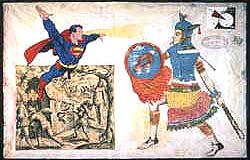
The Popes' Requirement
The Spanish didn't just take possession of the New World by default—because no one else claimed it. They didn't just occupy it in a burst of enthusiasm and legitimize their claims later. From the beginning, they followed an official procedure for declaring their ownership of the world. In other words, for stealing someone else's property.
In American Indian Sovereignty: Now You See It, Now You Don't, Peter d'Errico explains how the Spaniards asserted their global dominance:
The (in)famous Spanish Requirement of 1513 is perhaps the most straightforward example. It was called the "requirement" because royal law required it to be read before hostilities could be undertaken against a native people. In Latin and/or Spanish, witnessed by a notary, the Conquistadors read:
On the part of the king, Don Fernando, and of Doña Juana, his daughter, queen of Castile and Leon, subduers of the barbarous nations, we their servants notify and make known to you, as best we can, that the Lord our God, living and eternal, created the heaven and the earth, and one man and one woman, of whom you and we, and all the men of the world, were and are descendants, and all those who come after us. ... Of all these nations God our Lord gave charge to one man, called St. Peter, that he should be lord and superior of all the men in the world, that all should obey him, and that he should be the head of the whole human race, wherever men should live, and under whatever law, sect, or belief they should be; and he gave him the world for his kingdom and jurisdiction.
.
.
.
One of these pontiffs, who succeeded that St. Peter as lord of the world in the dignity and seat which I have before mentioned, made donation of these isles and Terra-firma to the aforesaid king and queen and to their successors, our lords, with all that there are in these territories....Wherefore, as best we can, we ask and require you that you consider what we have said to you, and that you take the time that shall be necessary to understand and deliberate upon it, and that you acknowledge the Church as the ruler and superior of the whole world.
.
.
.
But if you do not do this, and maliciously make delay in it, I certify to you that, with the help of God, we shall powerfully enter into your country, and shall make war against you in all ways and manners that we can, and shall subject you to the yoke and obedience of the Church and of their highnesses; we shall take you, and your wives, and your children, and shall make slaves of them, and as such shall sell and dispose of them as their highnesses may command; and we shall take away your goods, and shall do you all the mischief and damage that we can, as to vassals who do not obey, and refuse to receive their lord, and resist and contradict him: and we protest that the deaths and losses which shall accrue from this are your fault, and not that of their highnesses, or ours, nor of these cavaliers who come with us.
When the Spaniards read the Requirement, the Indians naturally didn't understand it. Did the Spaniards really expect the Indians to suddenly comprehend a foreign language? Or was this an insincere and immoral rationalization of the evils that followed?
"All the mischief and damage that we can"
The Spanish conquistadors followed the Pope's Requirement to the letter, imposing "deaths and losses" and blaming the Indians for it. True, priests sometimes spoke up against the maltreatment of Indians, and officals ordered it stopped. But these halfhearted protests did little to halt the depredations of the front-line soldiers and settlers.
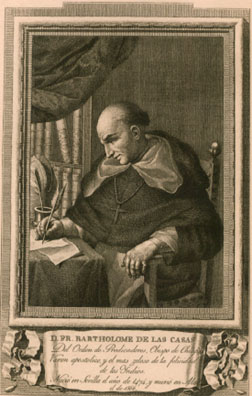
Those who did wrong knew what they were doing. They were intentionally committing acts of genocide, knowing they wouldn't get much more than a slap on the wrist if caught. The following quotes make these attitudes clear:
While the English were building the New Israel in North America, Spain and Portugal were conquering Central and South America. The conquest of Canaan was the model for their invasion of America. Mexican biblical scholar Elsa Tamez explains:
The story of the conquest of Canaan is the most often used biblical foundation for the conquest of this continent. Juan Gines de Sepulveda [a prominent and influential Spanish philosopher of the 16th century] used this biblical theme to legitimate the war against its inhabitants....He justified the conquest in order to punish blasphemy, but also because the continent was a special donation by God, as the promised land (The Pope as Christ's vicar had the authority to give the lands.) God chose the Spanish to carry out this divine judgment against the infidels, and to conquer their lands. From this Sepulveda affirmed that such a war besides being licit, was necessary because of the gravity of the people's crimes.
There were voices to the contrary. The loudest belonged to Bartolomé de las Casas (1474-1566). For many years he bravely defended Indigenous Peoples against the conquistadores. Most Spaniards, however, believed in the righteousness of their cause. They also believed that Native Americans were "naturally wicked." "God condemned the whole race of Indians to perish, for the horrible sins committed in their paganism," a priest declared. A popular saying said it: "Just as Joshua was willed by God to destroy the people of Canaan because they were idolaters, thus God willed Spain to destroy the Indians."
Roy H. May Jr., Native Americans and John Wesley
Priests and officials knew better
Because Spanish priests protested the official actions, we know the Europeans weren't brainwashed as a whole, unable to understand the consequences of their actions. Everyone knew the popes were corrupt; that's why England broke away to form the Anglican Church and Martin Luther instigated the Protestant Reformation. Despite this known immorality, the conquerors used papal rationalizations to amass power and wealth. They consciously ignored their priests' protests and consciously implemented their leaders' genocidal wishes.
Some examples of how priests and other officials knew the conquistadors were disobeying God and Jesus:
As a result of the sufferings and hard labor they endured, the Indians choose and have chosen suicide....Many when pregnant, have taken something to abort and have aborted. Others after delivery have killed their children with their own hands, so as not to leave them in such oppressive slavery.
Pedro de Cordoba, letter to King Ferdinand, 1517
How much damage, how many calamities, disruptions and devastations of kingdoms have there been? How many souls have perished in the West Indies over the years and how unjustly? How many unforgivable sins have been committed? ... What we committed in the West Indies stands out among the most unpardonable offenses ever committed against God and mankind.
Bartolomé de las Casas, Historia de las Indias, c. 1527
Francisco Vasquez de Coronado, who led an expedition to find the legendary Cibola in 1540, was one wrongdoer. The following excerpts come from a documentary, "Conquest of America: Southwest," by the History Channel. First, from the beginning of Coronado's trek:
A few days into the journey, Vasquez de Coronado delivers instructions from the viceroy and the king. "No profanity, blasphemy, gambling. No sleeping with Native women, or stealing from the Natives we might encounter will be tolerated. This mission is Christian and apostolic, and not a butchery. And all Indians must be treated as if they are Spaniards."
The king issued directive after directive mandating fair and benign treatment of the Native peoples of the New World. It's easy to sit in Madrid or Toledo and make laws. It's quite another thing in the midst of a large population of hostile or resistant Indians.
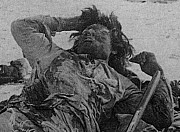
After Opata Indians killed Coronado's second in command on the way:
Francisco de Coronado and his captains, in the province of Chiametla, without justification or cause in the least legitimate, seized eight men and women, more or less, and had some of them hung, and the rest quartered.
Coronado found only the humble Pueblo villages, not a city of gold. He forced them to submit, but they soon rebelled. To quell their revolt, Spaniards starved the people, burned their pueblos, set dogs on them, burned them alive, and cut off their hands. Then:
Sept. 3, 1544
Two years, later, Vasquez de Coronado is put on trial for cruelty to the Pueblo Indians.
The Spanish wrestled mightily with the problem of whether it was legitimate to compel people to the true faith or whether that activity had to be carried out only by peaceful means. No other European nation struggled in the same way, maybe because the Spanish did it first.
Vasquez de Coronado and 17 other witnesses will give testimony. After three and a half years of deliberation, he is cleared of all charges.
Coronado himself never was punished, nor did anyone deny these things had happened. They just said they were justified.
(Source: Narrators and commentators, "Conquest of America: Southwest.")
Then there was Juan de Oñate, who led an expedition to New Mexico in 1598 and took possession of it for Spain.
Fray Francisco de San Miguel stated that instead of preaching the word of God to the Indians, "he has seen the Spaniards blaspheme it." He always met with "great obstacles because of the bad treatment the Indians received from us. Our people do not leave them anything in their houses, either any living thing, food, or anything of value. For this reason the Indians run away." He had asked the governor "many times to have pity on the suffering of the natives and not to tolerate so many robberies and injustices. But as the country is so wretched and poor, the governor has not been able to effect any remedy, nor can he do so now.
"The fact is that in order to induce the Indians to furnish corn for food, it has been necessary to torture the chieftains, even to hanging and killing them. We find ourselves in extreme need of food and see the natives, starving to death, eating whatever filth there is in the fields, even the twigs from the trees, dirt, coal, and ashes.
"If we stay longer, the natives and all of us here will perish of hunger, cold, and nakedness."
The bad treatment of the Indians, said Fray Francisco de Zamora, had brought "great discredit on our teaching, for they said that if we who are Christians caused so much harm and violence, why should they become Christians?"
The Indians have been "stabbed and knifed when things were taken from them...not to mention the treatment of the Indian women...soldiers have violated them often along the roads." It was Fray Zamora's recommendation that New Mexico be abandoned "in order that we shall not all perish, particularly the women and innocent children." The church "was not gaining by our labors in this land, and in order that the word of God should not be further dishonored, nor his majesty deceived, as he has been to the present...we should leave this place."
Testimony against New Mexico Governor Juan de Oñate in his absence, 1601—excerpted in Pueblos, Gods and Spaniards
What happened when Oñate was brought to trial for his crimes? He was found guilty but pardoned for his service to the crown. For several decades thereafter, the governors of New Mexico brutalized the Indians just as Oñate had done.
Oñate was found guilty because the Spaniards knew brutalizing Indians was wrong. He was pardoned because they didn't care.

"The reason the Christians have murdered...is purely and simply greed"
In the preface to his A Short Account of the Destruction of the Indies (1542), Bartolomé de las Casas makes it clear what motivated the Spanish:
There are two main ways in which those who have travelled to this part of the world pretending to be Christians have uprooted these pitiful peoples and wiped them from the face of the earth. First, they have waged war on them: unjust, cruel, bloody and tyrannical war. Second, they have murdered anyone and everyone who has shown the slightest sign of resistance, or even of wishing to escape the torment to which they have subjected him. This latter policy has been instrumental in suppressing the native leaders, and, indeed, given that the Spaniards normally spare only women and children, it has led to the annihilation of all adult males, whom they habitually subject to the harshest and most iniquitous and brutal slavery that man has ever devised for his fellow-men, treating them, in fact, worse than animals. All the many and infinitely varied ways that have been devised for oppressing these peoples can be seen to flow from one or other of these two diabolical and tyrannical policies.
The reason the Christians have murdered on such a vast scale and killed anyone and everyone in their way is purely and simply greed. They have set out to line their pockets with gold and to amass private fortunes as quickly as possible so that they can then assume a status quite at odds with that into which they were born. Their insatiable greed and overweening ambition know no bounds; the land is fertile and rich, the inhabitants simple, forbearing and submissive. The Spaniards have shown not the slightest consideration for these people, treating them (and I speak from first-hand experience, having been there from the outset) not as brute animals -- indeed, I would to God they had done and had shown them the consideration they afford their animals -- so much as piles of dung in the middle of the road. They have had as little concern for their souls as for their bodies, all the millions that have perished having gone to their deaths with no knowledge of God and without the benefit of the Sacraments. One fact in all this is widely known and beyond dispute, for even the tyrannical murderers themselves acknowledge the truth of it: the indigenous peoples never did the Europeans any harm whatever; on the contrary, they believed them to have descended from the heavens, at least until they or their fellow-citizens had tasted, at the hands of these oppressors, a diet of robbery, murder, violence, and all other manner of trials and tribulations.
Indians' existence challenges Europe
In The Heritage of the Spanish Scholastics, Leonard Liggio addressed the issue of European culpability head on:
The Yucatan was the center point of one of the most im- portant moral debates in history. It can be summarized in the title of the book, In Defense of the Indians: The Defense of the Most Reverend Lord, Don Fray Bartolome de las Casas, of the Order of Preachers, Late Bishop of Chiapa, Against the Persecutors and Slanderers of the Peoples of the New World Discovered Across the Seas.
.
.
.
For one hundred years before Las Casas's writings, Portugal had been in contact with African civilizations along that continent's western coasts. By the beginning of the sixteenth century, the BaKongo kingdom of the Lower Congo not only exchanged diplomatic representatives with the Holy See and the kingdoms of Portugal and Castile, but the son of the BaKongo king was consecrated a bishop in Rome and returned to administer his diocese in the Congo. The glorious civilizations of the African kingdoms and the successful completion of theological studies by African priests left no question of the intellectual and religious equality of the African peoples.
Thus, the claim of the Castilian conquistadors that the Native Americans were intellectually and spiritually inferior was a new charge. Indeed, it was so novel that there were no traditions in Western thought to justify it. There was nothing in the Fathers of the church–Greek, Antiochan, Alexandrian, African, Roman, or Gallic–to justify it. Nor was there anything in the seventy-six volumes of the Abbe Migne's Patrologia Latina, nothing in the writings of Tertullian, Augustine in Africa, the Italians, Ambrose, Jerome, or the Gaullic Pelagius.
A New World and Modern Problems
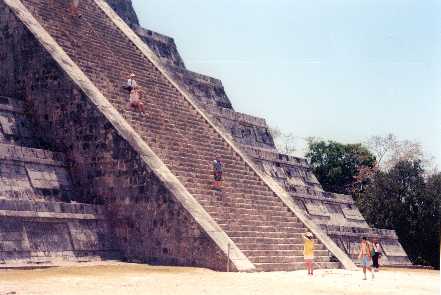
In a major contribution, Aristotle and the American Indians: A Study of Race Prejudice in the Modern World, Lewis Hanke notes that already in 1511 on the island of Hispaniola the Castilians' murder, robbery, and enforced labor of the Native Americans were chastised by the Dominican friar, Antonio de Montesinos, who preached on the text, "I am a voice crying in the wilderness." According to Hanke, "Montesinos delivered the first important protest against the treatment being accorded the Indians by his Spanish countrymen, enquiring: ‘Are these Indians not men? Do they not have rational souls? Are you not obliged to love them as you love yourselves?' " This sermon in America led immediately to a dispute at Burgos in Spain from which were issued the first two Spanish treatises on Indian problems and the first code drawn up for the treatment of Indians by Spaniards, the Laws of Burgos. It is worth noting that one of these treatises by the friar Matias de Pax, titled Concerning the Rule of the Kings of Spain Over the Indians, is not only the first study of this question by a Dominican but also the first known statement that the American Indians are not slaves in the Aristotelian sense.
The Laws of Burgos were proclaimed in 1512 but not rigorously followed. The new king of Castile, the Holy Roman Emperor Charles V, reinvestigated the issues. The first specific American application of the Aristotelian doctrine of natural slavery occurred in 1519 when Juan Quevdeo, bishop of Darien, and Las Casas clashed at Barcelona before the young Emperor Charles V. Las Casas enunciated the basic concept that was to guide all his action on behalf of the Indians during the remaining half-century of his passionate life: "Our Christian religion is suitable for and may be adapted to all the nations of the world, and all alike may receive it; and no one may be deprived of his liberty, nor may he be enslaved on the excuse that he is a natural slave, as it would appear that the reverend bishop (of Darien) advocates."
Juan de Zumarraga, Franciscan and bishop of Mexico, played a notable role in this conflict of ideas simply by believing that the Indians were rational beings whose souls could be saved. This conviction formed the basis for every one of his contributions to Mexican culture: the establishment of the famous colegio for boys at Tlatelollco and the school for Indian girls in Mexico City, the bringing of the first printing press to America, the movement for a university in Mexico, and the writing of books for Indians. An indication of the bitter and open conflict that raged on the subject in 1537, the year after Zumarraga established the school for Indians at Tlatelollco, is the fact that Pope Paul III found it necessary to issue the famous bull Sublimis Deus in which he stated that Indians were not to be treated as "dumb brutes created for our service" but "as truly men … capable of understanding the Catholic faith." And the pope ordered: "The said Indians and all other people who may later be discovered by Christians, are by no means to be deprived of their liberty or the possession of their property, even though they may be outside the faith of Jesus Christ … nor should they in any way be enslaved."
Theologian upholds Native rights
From Filling the Void in Indian Law Doctrine in Indian Country Today, 3/17/06:
Relying on the teachings of Aristotle and Thomas Aquinas, Dominican theorists of 16th-century Spain produced a code of conduct toward the Indian nations that compares favorably with the Anglo-American tradition. The leading thinker, Francisco de Vitoria (1485? — 1546), expressly repudiated the doctrine of discovery. Sadly, this teaching was honored mainly in the breach, and it originated in reaction to horrendous atrocities. But the story deserves to be studied widely in Indian country and to be brought to the attention of Supreme Court justices at every opportunity.
It began with the arrival of Dominican missionaries in Hispanola in September 1510. Horrified by what they saw happening, they made a public protest in a famous Advent sermon in December 1511, delivered in the presence of the leaders of New Spain. "Are the Indians not men?" said the chosen orator, Antonio de Montesinos. "Do they not have rational souls? With what right do you keep them in this servitude? With what authority have you waged these detestable wars against these people who lived peacefully in their own lands?"
The sermon was a bombshell. Diego Columbus, Christopher's heir as viceroy, complained directly to Spain's King Ferdinand and threatened to expel the Dominicans. The controversy in Spain mobilized the considerable intellectual resources of the Dominican Order.
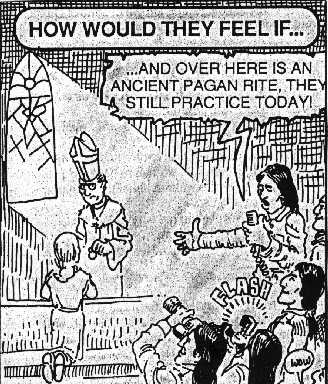
Perhaps the leading theologian of the day was de Vitoria, professor at the University of Salamanca. He addressed the rights of the Indian nations and the basis of Spanish rule in the New World in two treatises written in 1532, which are now considered key to the emergence of international law. The first relectio "On the Indians Lately Discovered" begins with a justification for questioning a fait accompli. "When we hear of so many massacres, so many plunderings of otherwise innocent men, so many princes evicted from their possessions and stripped of their rule, there is certainly ground for doubting whether this is rightly or wrongly done."
Following the disputational style of Aquinas and the medieval scholastics, de Vitoria took up the standard arguments for subjugating the indigenous peoples, "that they were sinners or were unbelievers or were witless or irrational," and refuted them. The fact they had no knowledge of Christianity or practiced sinful customs, not even human sacrifice, had no bearing on their inherent right to self-rule. De Vitoria turned to Aquinas' basic premise, that natural law was rooted in universal human reason, as opposed to divine law, which derived from revelation. Political authority derived from the Creator in the sense that he had made man as a political animal, with a natural tendency to live in a social order. The Indian nations fully satisfied the criteria for political dominion, for what we now call sovereignty:
"They are not of unsound mind, but have, according to their kind, the use of reason. This is clear, because there is a certain method in their affairs, for they have polities which are orderly arranged and they have definite marriages and magistrates, overlords, laws and workshops, and a system of exchange, all of which call for the use of reason; they also have a kind of religion."
Indians might say we don't need a theologian to tell us we can take care of ourselves, thank you very much; but de Vitoria's audience was a kingdom that was stealing great wealth from the Native nations. In the midst of this record of blood and greed, his admonition is startling: "The upshot of all the preceding is, then, that the aborigines undoubtedly had true dominion in both public and private matters, just like Christians, and that neither their princes nor private persons could be despoiled of their property on the ground of their not being true owners."
This left the problem of justifying the Spanish presence in the New World, and de Vitoria was equally bold in demolishing the "Seven False Titles" for Spanish rule. Neither the Holy Roman Emperor nor the Pope could grant it, since their authority didn't reach this newly discovered non-Christian world. Discovery itself was meaningless, even though Columbus relied on it. It granted title only to the first arrivals in a deserted region; and the Indians were there first. This title "in and by itself ... gives no support to a seizure of the aborigines any more than if it had been they who had discovered us."
Even conversion of unbelievers wasn't a sufficient excuse. Conversion by force of arms was illegitimate, and Indians had no obligation to accept a religion that the Spaniards they met were observing so poorly. Ultimately, of course, de Vitoria did justify Spanish rule, but his grounds are still surprising. Indian princes, he argued, had allied themselves voluntarily with the conquistadors to pursue their own wars, "as the Tlaxcaltecs are said to have done against the Mexicans." This was the mechanism for the expansion of the Roman empire, which the church approved as lawful.
We admit that we present the most humane of Vitoria's conclusions. Much of his argument is densely medieval, and he calmly presents the pros and cons of some distasteful conquistador prejudice. But the results vindicate his spirit. He set the intellectual ground for the remarkable career of fellow Dominican Bartolome de las Casas, a veteran of the New World expeditions, who devoted most of his long life to the defense of the Indian peoples. De las Casas envisioned a Spanish dominion over sovereign Indian nations, whose rights of self-government derived from Thomist natural law.
Europeans debate their own evil
Thomas R. Berger picks up the thread in his essay titled "Native History, Native Claims, and Self-Determination" (B.C. Studies, Spring 1983):
In Spain, lawyers and clerics struggled with the questions of law and morals that this epochal discovery presented. By what right did the Europeans conquer these people, take their land, and subjugate them? There were two views. Juan Gines de Sepulvèda, the greatest Aristotelian philosopher of the day, relied on the doctrine propounded by Aristotle in his Politics, that some races are inferior to others, that some men are born to slavery. By this reasoning, the Europeans, a superior race, were justified in subjugating the Indians, an inferior race. On the other hand, there was the view propounded by Bartolomé de las Casas, God's angry man of the sixteenth century. He argued that all men are endowed with natural rights, that the Europeans had no right to enslave the Indians, that according to natural law the Indians were entitled to live as free men, under their own rulers and their own laws.
In 1550, Charles V, King of Spain and Holy Roman Emperor, directed that a junta of theologians, judges, and court officials — fifteen in all — assemble at the University of Valladolid to consider the arguments on either side. This they did and, as Lewis Hanke has said, "Then for the first, and doubtless for the last, time a colonizing nation organized a formal enquiry into the justice of the methods used to extend its empire." [1]
The question on which the King sought advice from the junta was: "How can conquests, discoveries and settlements be made to accord with justice and reason?" Here is Hanke's account of the argument advanced by Sepulvèda. Sepulvèda said that the Indians

require, by their own nature and in their own interests, to be placed under the authority of civilized and virtuous princes or nations, so that they may learn, from the might, wisdom and law of their conquerors, to practise better morals, worthier customs, and a more civilized way of life. [2]
Compare then those blessings enjoyed by Spaniards of prudence, genius, magnanimity, temperance, humanity, and religion with those of the homunculi [little men] in whom you will scarcely find even vestiges of humanity, who not only possess no science but who also lack letters and preserve no monument of their history except certain vague and obscure reminiscences of some things in certain paintings. Neither do they have written laws, but barbaric institutions and customs. They do not even have private property. [3]
The bringing of iron alone compensates for all the gold and silver taken from America. To the immensely valuable iron may be added other Spanish contributions such as wheat, barley, other cereals and vegetables, horses, mules, asses, oxen, sheep, goats, pigs, and an infinite variety of trees. Any one of these greatly exceeds the usefulness the barbarians derived from gold and silver taken by the Spaniards. All these blessings are in addition to writing, books, culture, excellent laws, and that one supreme benefit which is worth more than all others combined: the Christian religion. [4]
Las Casas' views were already well known. He regarded the Indians as people with an evolved culture, possessing their own social, economic, and religious institutions. [5] (He had, in fact, been instrumental in securing the passage of the New Laws of 1542 abolishing the encomienda under which Indians were allotted to the Spaniards together with land — the New Laws, however, were never enforced because of the outcry from the colonists.) According to Las Casas, the Indians were rational beings, fit to be compared to the Greeks and Romans.
.
.
.
Las Casas discussed the Indian economy, architecture, and religion....He sought to demonstrate that Indian culture, customs, and institutions deserved respect on their own terms. "All the peoples of the world are men," he said. Sepulvèda and Las Casas addressed the junta in turn. The debate apparently went on for weeks, after which the junta adjourned to consider what advice to give the King. Unfortunately it is not now known what decision the junta came to, and there is still controversy as to whether or not they ever did deliver an opinion to the King. In any event, Charles V soon abdicated and entered a monastery, to be succeeded by his son, Philip II. Thereafter events overtook the Indians and the other native peoples of the New World.
In short, enlightened members of Spanish American society knew they were morally obligated to leave the Indians alone. To leave the Indians, period. Their society didn't change its genocidal course because it was too steeped in immorality—too dedicated to a philosophy of conquest. Sepulvèda's views dominated the European mind.
For more on the question of whether the Indians owned or merely occupied the land, see Indians Owned the United States. For more examples of European evil, go to Why Learn This History Stuff Anyway?
More on the Sepulveda-Las Casas debate
Sepulveda — 'father of racism' — continues to haunt Supreme Court doctrine
Englishmen spread Spaniards' evil
If the Spanish were guilty of "purely and simply greed," what about the English who followed them? A memorable resolution by Connecticut's colonists seems to say it all:
1. Resolved that the earth is to be given to the saints, and,
2. That we, being saints, do hereby take possession.
Gary B. Nash elaborates in Red, White, and Black: The Origins of Racism in Colonial America:
Beginning with the Jamestown settlement of 1607 and intensifying with the great Puritan migration of the 1630s, Englishmen coming to the New World thought less about Indian trade, the Northwest Passage, and fabled gold mines and more about land. As the dreams of El Dorado evaporated, English attention centered on the less glamorous goal of permanent settlement. Now land became all-important, for without land how could there be permanent settlement? The Indian, who had been important when trade and exploration were the keys to overseas involvement, became an inconvenient obstacle. One Englishman went to the heart of the difficulty in 1609: "by what right or warrant can we enter into the land of these Savages, take away their right-full inheritance from them, and plant ourselves in their places, being unwronged or unprovoked by them?4 It was a cogent question to ask, for Englishmen, like other Europeans, had organized their society around the concept of private ownership of land. They regarded it, in fact, as an important characteristic of their superior culture. Colonists were not blind to the fact that they were invading the land of another people, who by prior possession could lay sole claim to the whole of mainland America.  The resolution of this moral and legal problem was accomplished by an appeal to logic and to higher powers. The English claimed that they came to share, not appropriate, the trackless wilderness. The Indians would benefit because they would be elevated far above their present condition through contact with a richer culture, a more advanced civilization, and most importantly, the Christian religion. Samuel Purchas, a clerical promoter of English expansion, gave classic expression to this idea: "God in wisedome ... enriched the Savage Countries, that those riches might be attractive for Christian suters, which there may sowe spirituals and reape temporals." Spirituals, to be sown, of course, meant Christianity; temporals to be reaped meant land. Purchas went on to argue that to leave undeveloped a sparsely settled land populated only by a few natives was to oppose the wishes of God who would not have showed Englishmen the way to the New World if he had not intended them to possess it.5 Moreover, if the English did not occupy North America, Spain would; and the Indians would then fall victim to Catholicism.
The resolution of this moral and legal problem was accomplished by an appeal to logic and to higher powers. The English claimed that they came to share, not appropriate, the trackless wilderness. The Indians would benefit because they would be elevated far above their present condition through contact with a richer culture, a more advanced civilization, and most importantly, the Christian religion. Samuel Purchas, a clerical promoter of English expansion, gave classic expression to this idea: "God in wisedome ... enriched the Savage Countries, that those riches might be attractive for Christian suters, which there may sowe spirituals and reape temporals." Spirituals, to be sown, of course, meant Christianity; temporals to be reaped meant land. Purchas went on to argue that to leave undeveloped a sparsely settled land populated only by a few natives was to oppose the wishes of God who would not have showed Englishmen the way to the New World if he had not intended them to possess it.5 Moreover, if the English did not occupy North America, Spain would; and the Indians would then fall victim to Catholicism.
.
.
.
John Winthrop, who led the Massachusetts Bay Colony throughout the 1630s, often mentioned the Puritans' obligation to convert the natives, giving the impression that he felt a real compulsion to "save their souls for Christ." But a careful reading of early New England literature suggests that with significant exceptions such as Roger Williams, the Puritans held the natives in contempt and would have preferred them all dead or removed from the region where they were building their "city on the hill." Winthrop remarked in his journal that the smallpox epidemic of 1617, communicated to the Indians by visiting fishermen, was God's way of "thinning out" the native population to make room for the Puritans. Another prominent puritan referred to the epidemic, which ravaged the New England natives, as a "wonderful Plague." Later Winthrop wrote that the Indians "are neere all dead of the small Poxe, so the Lord hathe cleared our title to what we possess." 10 Rather than civilize or proselytize the natives, it was easier to see them eliminated by European diseases and then to interpret this as God's wish.
Englishmen terrorized Indians
Of course, when disease didn't do the trick, the Englishmen were more than willing to help God implement his will. Mike Kohr sets the scene in Your Heroes Are Not Our Heroes:
In 1636, the Pilgrims—eager to appropriate land belonging to the Pequot people—formed an alliance with the Narragansetts. Surrounding a Peqout village on the site of present-day Mystic, Connecticut, this force promptly set fire to the village and put to the sword all those who attempted escape. In an hour's time seven were taken captive, seven escaped, and between 600 to 700 lay dead.
A site aptly called The Pilgrims: Children of the Devil delivers the coup de grace:
William Bradford, in his History of the Plymouth Plantation, described the carnage: "Those that scaped the fire were slaine with the sword; some hewed to peeces, others rune throw with their rapiers, so as they were quickly dispatche, and very few escaped. It was conceived they thus destroyed about 400 at this time. It was a fearful sight to see them thus frying in the fyer, and the streams of blood quenching the same, and horrible was the stincke and sente there of, but the victory seemed a sweet sacrifice, and they gave the prayers thereof to God, who had wrought so wonderfully for them, thus to inclose their enemise in their hands, and gave them so speedy a victory over so proud and insulting an enimie."
So this wasn't an unfortunate incident gone awry. It was a deliberately planned massacre. In Chapter 1 of his A People's History of the United States 1492—Present, Howard Zinn puts this in context:
So, the war with the Pequots began. Massacres took place on both sides. The English developed a tactic of warfare used earlier by Cortés and later, in the twentieth century, even more systematically: deliberate attacks on noncombatants for the purpose of terrorizing the enemy. That is ethnohistorian Francis Jennings's interpretation of Captain John Mason's attack on a Pequot village on the Mystic River near Long Island Sound: "Mason proposed to avoid attacking Pequot warriors, which would have overtaxed his unseasoned, unreliable troops. Battle, as such, was not his purpose. Battle is only one of the ways to destroy an enemy's will to fight. Massacre can accomplish the same end with less risk, and Mason had determined that massacre would be his objective."
Sounds like American-style terrorism to me.
As disease and warfare cleared out the Eastern seaboard, the population grew and society became more complex. Legislatures passed laws controlling the Indians and the burgeoning slave trade. Then came the Revolutionary War, westward expansion, and Manifest Destiny.
The pattern was set
Was the Age of Discovery—i.e., the pre-Revolutionary wave of European conquest and colonization—a unique historical period? An exception? An aberration? Subsequent events prove otherwise:

A second wave of European conquests took place during the nineteenth century as a result of the industrial revolution. By 1890, practically every inhabitable place on the globe was dominated either by a European power or a settler regime speaking a European language. European colonization produced most of the most horrific stories of all time, including numerous incidents of genocide. The Spanish destroyed the Indian populations of the Caribbean even before the great viral epidemics arrived, and Spain and Portugal exterminated the peoples and cultures of the Canary Islands. Belgium committed unspeakable acts of murder and brutality in the Congo and on one day -- January 14, 1904 -- Germany massacred 65,000 indigenous people in Namibia. Although there would be numerous nominees for the title of worst barbarians of all time, the English have a good claim to careful consideration. English speaking people committed numerous acts of genocide in Newfoundland, in Tasmania, and in California where whole peoples were slaughtered until none were left. They came close to success in Australia and in many parts of North America where the list of indigenous nations who greeted them diminished to but a few.
John C. Mohawk, Mohawk: The Tragedy of Colonization, Indian Country Today, 1/25/04
Every step of the way, Europeans knew they were doing wrong but did it anyway. Plenty of sources acknowledge and accept this negative view of the European mindset. Some quotes on the subject:
No civilization prior to the European had occasion to believe in the systematic material progress of the whole human race; no civilization placed such stress upon the quantity rather than the quality of life; no civilization drove itself so relentlessly to an ever receding goal; no civilization was so passion-charged to replace what is with what could be; no civilization had striven as the West has done to direct the world according to its will; no civilization has known so few moments of peace and tranquility.
William Woodruff, Impact of Western Man
Unlike the fur traders, who depended on the Indians to trap beaver, the settlers had no interest in preserving any part of tribal society. On the contrary, the Indians were seen merely as an impediment to progress, an impediment that must, in time, be destroyed.
America's Fascinating Indian Heritage
In their first encounters with the new breed the Indians found they could not be trusted, that their purpose here was not to pursue life, liberty and happiness but outright conquest, the greedy takeover of land and rights belonging to the natives.
The pattern was set, a pattern that was to prevail for three centuries of hostility and remains unresolved today. The attitude of white men was — here are these savage people in our way as we spread out. It is our right to be here and to improve the land so future generations can have a better, fuller life. The Indians could only see the whites as intruders who were destroying their lives and livelihood, attempting to inflict on them laws, church and foreign ideas.
Ralph W. Andrews, Indian Leaders Who Helped Shape America
The American empire's pathological mentality and behavior toward Native nations is predicated upon very old deep-seated metaphorical concepts transplanted from Europe, such as lordship, monarchy, dominion, domination, subjugation, subduing, exploiting, and the desire to profit as much as possible from all aspects of life. Native commentators have long noted that greed and lust for power lie at the heart of American pathology. Chief Joseph of the Nez Perce remarked: "My father was the first to see through the schemes of the white man, and he warned his tribe to be careful about trading with them. He had suspicion of men whom seemed anxious to make money."
Steven Newcomb, Newcomb: On America's Pathological Behavior Toward Native Peoples, Indian Country Today, 9/10/04
Europeans still want it all
European colonial powers...Hitler and Stalin...multinational corporations...Ronald Reagan and George W. Bush. People of European extraction—white, male, Christian, (mostly) Anglo-Saxon—still want to rule the world. This greed and lust for power is arguably the defining characteristic of Western civlization.
Nor has anything changed in recent years, despite the advent of human rights and multicultural awareness around the globe. Europeans and Americans, the inheritors of Western civilization, are still declaring their supremacy over others.
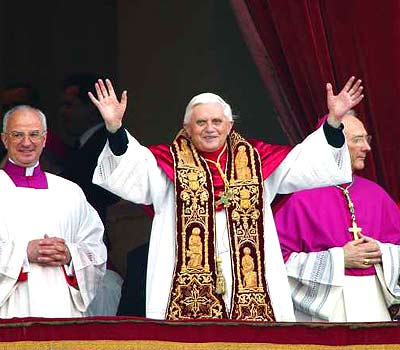
From A German Lesson: the Fallacy of One True Path by Daniel Jonah Goldhagen. In the LA Times, 4/22/05:
On Wednesday, in his first message as pope, Benedict called for "open and sincere dialogue" with other religions. But what does dialogue mean for him? In "Dominus Jesus" of 2000, his ringing millennial statement about the need for the Catholic Church's primacy over the world, Benedict gave his carefully considered answer. He calls for a world imperial church. He denigrates other religions as not being true religions or paths to salvation. He does mandate that, when in dialogue, the church must show respect for "the equal personal dignity of the parties" — but not for their religions. The church's dialogue with other religions, Benedict declares, "must be primarily committed to … announcing the necessity of conversion to Jesus Christ and adherence to the Church through baptism, and the other sacraments."
Returning to our original question: Did Europeans such as Columbus know what they were doing when they invaded America and captured or killed the Indians? Of course they did. They went ahead anyway.
Five hundred years from now, I'm guessing historians will offer the same excuses and rationalizations for our behavior today. "They didn't realize they were extinguishing thousands of species...causing massive climate change...destroying the planet's ecology. They simply didn't know any better."
Well, of course we know better. We simply don't care because it's not to our advantage to care. The evil European invaders thought the same way about conquering the Americas.
Evil Europeans in Newspaper Rock
Evil Europeans
More on evil Europeans
Spaniards = Nazis
Mortensen reads de las Casas
Indian country = Zion
The missions' mission
Colonization = digestion
Bible gave America to Anglos
How Europeans claimed the world
Pope backtracks on colonization
How wrong was the pope?
Pope insults Indians
How Europeans "discovered" the world
Related links
Genocide by any other name...
Guns, Germs, and Steel
America's exceptional values
Native vs. non-Native Americans: a summary
Readers respond
"When reviewing history, we should try to avoid looking it at it with our 21st century eyes...."
* More opinions *
|
|
. . .
|

|
Home |
Contents |
Photos |
News |
Reviews |
Store |
Forum |
ICI |
Educators |
Fans |
Contests |
Help |
FAQ |
Info
All material © copyright its original owners, except where noted.
Original text and pictures © copyright 2007 by Robert Schmidt.
Copyrighted material is posted under the Fair Use provision of the Copyright Act,
which allows copying for nonprofit educational uses including criticism and commentary.
Comments sent to the publisher become the property of Blue Corn Comics
and may be used in other postings without permission.









 The resolution of this moral and legal problem was accomplished by an appeal to logic and to higher powers. The English claimed that they came to share, not appropriate, the trackless wilderness. The Indians would benefit because they would be elevated far above their present condition through contact with a richer culture, a more advanced civilization, and most importantly, the Christian religion. Samuel Purchas, a clerical promoter of English expansion, gave classic expression to this idea: "God in wisedome ... enriched the Savage Countries, that those riches might be attractive for Christian suters, which there may sowe spirituals and reape temporals." Spirituals, to be sown, of course, meant Christianity; temporals to be reaped meant land. Purchas went on to argue that to leave undeveloped a sparsely settled land populated only by a few natives was to oppose the wishes of God who would not have showed Englishmen the way to the New World if he had not intended them to possess it.5 Moreover, if the English did not occupy North America, Spain would; and the Indians would then fall victim to Catholicism.
The resolution of this moral and legal problem was accomplished by an appeal to logic and to higher powers. The English claimed that they came to share, not appropriate, the trackless wilderness. The Indians would benefit because they would be elevated far above their present condition through contact with a richer culture, a more advanced civilization, and most importantly, the Christian religion. Samuel Purchas, a clerical promoter of English expansion, gave classic expression to this idea: "God in wisedome ... enriched the Savage Countries, that those riches might be attractive for Christian suters, which there may sowe spirituals and reape temporals." Spirituals, to be sown, of course, meant Christianity; temporals to be reaped meant land. Purchas went on to argue that to leave undeveloped a sparsely settled land populated only by a few natives was to oppose the wishes of God who would not have showed Englishmen the way to the New World if he had not intended them to possess it.5 Moreover, if the English did not occupy North America, Spain would; and the Indians would then fall victim to Catholicism.

